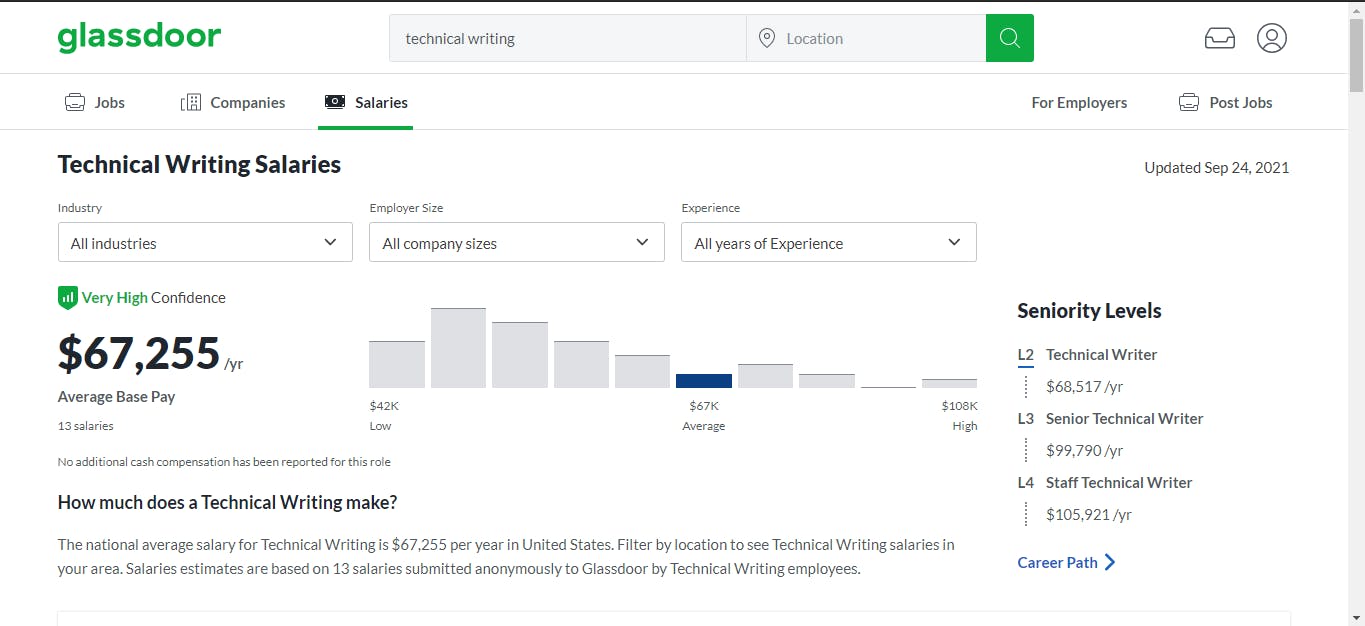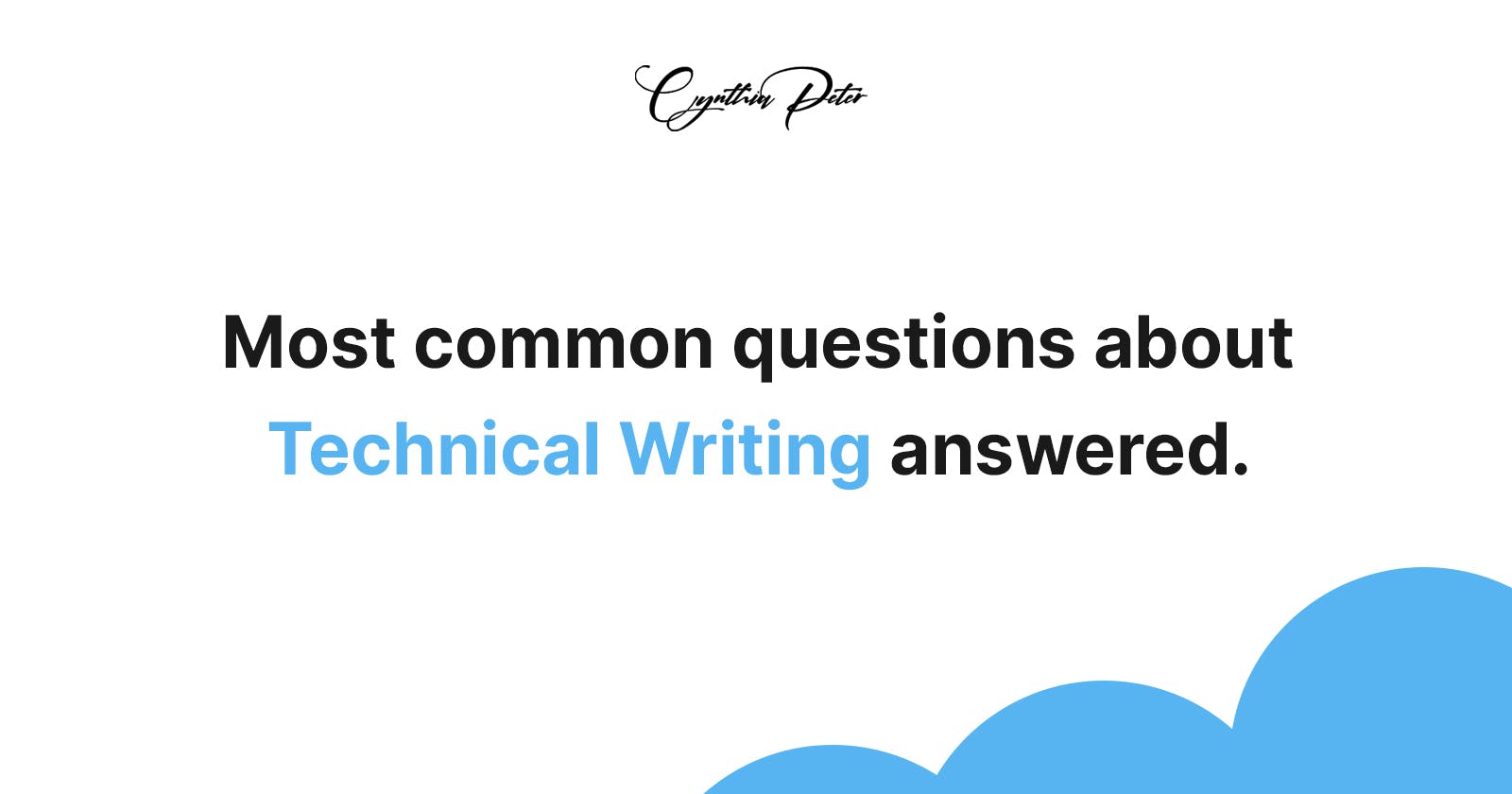You learned what technical writing is in a previous article. Who is a technical writer? How to get started with technical writing and some basics. After the previous article, I received a couple of questions, and I thought instead of just answering that one person, why not turn it into an article?
As I write this, I have no idea what title to give this piece, but I trust the skies for inspiration. While we wait on the skies, let's answer some questions.
How to Find your niche in tech writing
Like in any career path, especially in Tech, No one wakes up and decides that their path will be Machine Learning, Technical writing, UX design, or Software engineering. You have to start from the basics of that path and then grow from there.
You have to read, research, and practice different types of writing to know which one you'd prefer and stick with. I, for one, didn't start as a technical writer. I started as a Content writer, blogger, flutter developer, technical writer, and maybe soon-to-be UX writer.
All the skills I acquired as a copywriter, blogger, Flutter developer, and content writer has helped me become a better Technical writer. I know some things about empathy, SEO, SEM, Flutter, and more. I can comfortably write about Flutter because I used it as a mobile application developer. Adding that experience to my SEO skills, you've got a skilled writer who knows how to explain technical concepts found on the internet.
All I am saying is, to find your niche, you need to play in the mud, step into the playground, get your hands dirty, do some research, find out all the things you could do as a technical writer, and try as much as you can out and that can help you decide on what niche to focus on.
How much knowledge of Tech do I need to do technical writing?
Technical writing makes a concept, process, or service easy to understand. Technical writing can come as FAQs (Frequently Asked Questions), Knowledge base articles, help guides, instruction manuals, API documentation, or blogposts.
As a technical writer, you need as much information and skills to do your job comfortably. However, the major tasks that technical writers carry out are "Research and Writing."
To answer your questions, you'd need as much information to write any form of technical writing. That's why research takes 60-70% of a technical writer's time. Because to explain a process or concept, you need to understand it properly. How do you write Internal API documentation when you don't even understand what an endpoint is or what an API is, and how it works.
As a technical writer, your daily tasks should include lots of reading. Read many blog articles, and buy and read tech books for dummies, beginners, and kids. I suggest these kinds of books because they explain terms in a simple way, and if there is the best place to understand concepts quickly, then it's reading a book for kids or dummies.
This way, you learn about technical concepts daily and improve your knowledge base.
Tip: As a technical writer, try to learn a new technical word/concept/process daily. You'd be shocked at how much you've learned in a month.
Is there a permanent documentation style to stick to?
Not really. The style guide used per project depends greatly on you and the company you work with. So, if you're working on a personal project, you can play with style guides and see which one sticks.
On joining a company, some companies follow Microsoft's style guide, some follow diataxis, Gatsby StyleGuide, or Google technical writing guides.
There are no rules. You can create your style guide and watch the world of technical writers adapt it.
Can I write for users and developers, or do I need to choose one?
This question must've come from the previous article also, where I explained that as a technical writer, you get to create content for both users and developers.
To answer this, you can write for both groups. You will need to write for both groups often in your career as a technical writer. Learning to understand how to write for a specific audience is a crucial skill to have as a technical writer, and if you can write to suit both audiences, you're blown.
How do I sell myself as a technical writer?
To sell yourself as a technical writer, you must have a blog. Somewhere holds different articles explaining technical concepts, processes, or your thoughts about technical writing or your interests.
It is also essential you are visible on social media. Understanding SEO will help you position yourself well enough to be found online via a website, social media platforms like Twitter, Polywork, LinkedIn, and blogging platforms like medium, hashcode, dev.to, and much more.
Finally, there is no better way to sell yourself than to talk to people, attend boot camps and workshops, speak at events, contribute to open source projects, and network on social media platforms.
How lucrative is Technical writing?
The image below is from Glassdoor and shows a technical writer's average salary in the US.

Technical writing is super lucrative, and most recently, the majority of companies are beginning to understand the importance of technical writers on a team.
Does technical documentation allow for an engaging yet conversational writing style, irrespective of the style guide?
This is where the tone of voice comes in. When you look at famous technical writers, there is a tone. Mine, for example, is a cheerful and fundamental tone. I love to write articles that make the reader relaxed and calm. Reading and learning are complex. Why not make it easier and less severe?
Anyways, even with style guides, you can still retain your tone. You know when you read a book or an article, and it follows the typical style guide, but it sounds different from a previous article that explained the same thing?
There are over 7 billion people globally who can't read one article on APIs and understand it. That's why tone is essential. A style guide defines the structure of a technical piece. However, the writer's tone makes the work relatable to various readers.
Courses on technical writing, how and where to find them.
A couple of resources will help introduce you to technical writing. I have made a list of these resources and shared them on this Github Repository file so I can easily update it, and you, too, can contribute to it.
Bonus Question: Do I have to work closely with a tech bro/Sis to be a badass technical writer?
The answer is 'No!'
As a technical writer, aside from research and writing, an important skill to have is effective communication. You need to be able to ask questions to your team members or developers that you'd be working with.
You will always need to work closely with developers because you're either documenting a product they developed, trying to create a knowledge base for them, or simply documenting an API. Whatever you do, you are either writing to solve the problem of a developer or a user and do do either one, you need to understand the product or process, and that can be achieved by clearly communicating with the developers in question.
Finally, Technical writing is a skill that allows for daily learning and growth. And to stay in this field means to wake up daily and decide to learn and grow.
I hope this article was able to answer your questions appropriately. Do not hesitate to reach out if you have any contributions or corrections. We are on a journey toward learning, and I would love to learn from you too.
Ciao!

